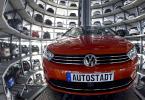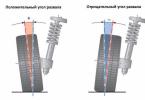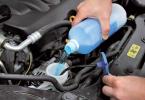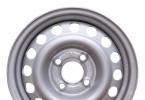Today we will talk about Volkswagen aktiengesellschaft which literally translates from German as Volkswagen joint stock company. Yes, this is how VAG stands for, although in our country everyone is used to thinking that VAG is the Volkswagen Audi Group, but this is more of a popular name.
VAG is also sometimes called Volkswagen Konzern, Volkswagen Group, VW Group.

Let's see what Volkswagen aktiengesellschaft is. This joint-stock company includes 342 companies that are engaged in the production of cars and everything connected with it. There is a small legal confusion within the company that does not provide a clear picture of the owner of the concern. Volkswagen is partially owned by Porsche automobil Holding SE, to be precise 50.73%. In turn, Volkswagen AG owns 49.9% of the Porsche Zwischenholding GmbH holding. That is, today it is such an automobile giant consisting of Volkswagen and Porsche. The company is even negotiating a merger into a single Volkswagen Porsche structure.

And yet, how did it happen that one company owns so many car brands? The thing is that at the end of the last century, Volkswagen was experiencing serious financial difficulties. In 1993, Ferdinand Piech was appointed chairman of the board of the concern, who helped the company to get out of the deepest crisis.

He managed to optimize the work of the enterprise well and get out of the crisis while buying up weak car brands at that moment.
Which brands are included in Volkswagen aktiengesellschaft?
1. - produces cars

2. - the company was bought from daimler-benz in 1964.

3. - the company was acquired in 1991.

4. is an Italian brand of passenger cars that was bought from the state in 1986.

5. Bentley - cars of the premium segment, the brand was purchased in 1998.

6.Lamborghini is a supercar car company owned by Audi, which bought it in 1998.

7.Porsche - we have already said about the confusion with shares, but still it is believed that Porsches are part of Volkswagen.

8.Ducati Motor is a brand little-known in the CIS, but very popular abroad, is engaged in the production of premium motorcycles, also acquired by Audi in 2012.

Scania AB - 70% of the shares were acquired in 2009, the company produces truck tractors and trucks, which, by the way, are in great demand in the Russian Federation

Man, acquired 56% in 2011, also manufactures truck tractors, trucks, dump trucks and buses.

There is another company called Volkswagen comercial Vehicles that manufactures commercial vehicles. These are cars like the Volkswagen Crafter.
Some facts about VAG
2005 the concern produced 5.22 million cars

In 2006, the concern sold 5.72 million vehicles, net profit for this period amounted to 2.75 billion euros (Hello AvtoVAZ)
In the very early days of the automotive industry, all car manufacturers were of course independent from each other. But . As a result, more successful car companies started buying competing auto brands. Subsequently, the world's largest conglomerates began to be created in the auto industry, which to this day are the largest auto companies in the world in terms of the number of products produced and, of course, in terms of sales. Let's take a look at the current state of the global auto business. We invite you to find out which famous and popular ones are currently under the control of large corporations and auto alliances.
Abarth - Owned by Fiat / Chrysler

Abarth was founded in 1949. Initially, the auto brand was engaged in the production of racing cars and the production of auto components for high-performance vehicles. In 1971, the founder of the company, Carlo Abat, sold his brand to the company. Abarth is currently producing more powerful versions based on Fiat vehicles.
Alfa Romeo - Owned by Fiat / Chrysler

At the moment, the Audi brand is the largest part of the world's largest auto concern Volkswagen.
Bentley - Owned by Volkswagen

Ferrari - Owned by Fiat

In 1969, Fiat acquired a 50% stake in Ferrari after Ford's planned buyout of the Italian premium brand was canceled. Ultimately, Fiat increased its stake to 90%. In 2014, Fiat Chrysler decided to separate the brand from the main group. As a result, the deal was completed in 2016, and the Agnelli family, who founded Fiat, became the largest shareholder of Ferrari.
Infiniti - Owned by Nissan

Lamborghini - owned by Volkswagen

In the late 1980s and early 1990s, Lamborghini was owned by the Chrysler concern. Currently part of the Volkswagen Group. Lamborghini became part of this company in 1998, when the brand came under control.
Land Rover - Owned by TATA

Land Rover has been owned by many well-known automotive brands over the long history of the automotive industry, from and ending with the American company Ford. But in 2008, the Land Rover brand, along with Jaguar, came under the control of Indian industrial giant Tata. Immediately after the takeover, the two independent brands and Jaguar were merged into one company.
Lexus - Owned by Toyota

Lexus is wholly owned by Toyota. The brand is a luxury division of a Japanese company. Like Acura, Infiniti, which are owned and accordingly, the Lexus brand has been brought to market to enter the premium car market in the US as well as the UK.
Lotus - Owned by Proton

Malaysian automaker Proton bought the company in 1993 from Italian businessman Romano Artioli (who owned Bugatti in those years). Today, the Lotus brand is still owned by Proton. The strangest thing is that Lotus cars are still produced and sold all over the world (mainly in England), while the production of cars under the Proton brand was discontinued.
Maserati - Belongs to Fiat-Chrysler

Maserati has been a 100% Fiat subsidiary since 1993. Today it belongs to the auto concern Fiat-Chrysler.
Mercedes - Owned by Daimler

Mercedes-Benz is the largest and best-known automotive brand in the Daimler corporation. Daimler also owns several commercial vehicle manufacturers.
MG - Owned by Saic

MG is owned by a Chinese company after MG Rover went bankrupt in 2005. Initially, the MG brand was bought by the Chinese company Nanjing Automobile, but then it was bought by the Shanghai company SAIC.
Mini - Owned by BMW

In 2000, BMW sold their MG, Rover and Land Rover brands, which are known to be part of the Rover Group. But on the sale, BMW retained control of Mini. As a result, today BMW, in addition to Rolls-Royce, retains control over the brand.
Mitsubishi - Owned by Nissan-Renault

Mitsubishi Motors is the automotive division of the Mitsubishi Group, which, in addition to the automotive industry, is involved in projects in nuclear power, banking and many other business areas. In October 2016, Nissan became the largest shareholder in the company by purchasing 34% of the shares. This is how Mitsubishi became part of the Renault-Nissan auto alliance.
Nissan - Belongs to Renault-Nissan auto alliance

After several years of financial difficulties, Nissan entered into an alliance with Renault in 1993. Technically, the two companies are separate. But the technologies, methods of work in the production of cars are the same. Autoalliance also has a single CEO, Carlos Ghosn. Nissan has a smaller stake in Renault, while Renault has a larger stake in Nissan, which is essentially a junior partner.
Porsche - Owned by Volkswagen

The car manufacturer is a subsidiary of Volkswagen.
Renault - Belongs to the Renault-Nissan alliance

Renault was once owned by the French government. In 1996 the company was privatized. But today France still has a stake in Renault. Today Renault is part of the world's largest auto alliance Renault-Nissan, which Mitsubishi also recently joined.
Rolls-Royce - Owned by BMW

Rolls-Royce Motors was bought by Volkswagen in 1998. Five years later, the company was taken over by BMW.
Seat - Owned by Volkswagen

Since 1986 it has been the single largest car manufacturer in Spain. Since this year, the company is part of Volkswagen.
Skoda - Owned by Volkswagen

Volkswagen began buying Skoda shares in 1991, at a time of great change in the former Czechoslovakia. Since 2000, Skoda has been wholly owned by the VW Group.
Smart - Owned by Daimler

Initially, the idea of a radical city car was first proposed by the owner of the watchmaker Swatch. Smart is now wholly owned by Daimler.
SsangYong - Owned by Mahindra & Mahindra

While SsangYong is still based in South Korea, the Korean auto brand is currently dominated by the Indian company Mahindra & Mahindra, which acquired 70% of the Korean company in 2011.
Subaru - Owned by Fuji

Subaru is owned by Fuji Heavy Industries (FHI), which will soon change its name to Subaru Corporation. FHI includes six independent automotive companies. The major shareholders of the company are Toyota and Suzuki. Suzuki has a large share.
Vauxhall / Opel - Owned by PSA (Citroen-Peugeot)

Vauxhall cars / although marketed as British and German car brands, in fact have long been part of the world's largest automaker General Motors. General Motors has owned the Vauxhall / Opel brands since 1925. In March 2017, it was announced that the Vauxhall / Opel brands were being taken over by the Citroen-Peugeot Auto Alliance (PSA).
Volvo - Owned by Geely

After more than 70 years Volvo was a fully independent Swedish car brand, in 2000 it became part of Ford, which after 9 years sold the Swedish brand to the Chinese company Geely.
Lada AvtoVAZ - Belongs to the Renault-Nissan and Rostec alliance

In 2008, Renault received a controlling stake over the AvtoVAZ car plant.
GAZ - Belongs to Basic Element, Oleg Deripaska

In 2000, a controlling stake in GAZ OJSC was acquired by Basic Element, Oleg Deripaska. In 2001, the Gorky Automobile Plant became part of the RusPromAvto auto holding.
The Volkswagen concern, headquartered in Wolfsburg (Germany), is one of the world's leading and largest European automakers. In 2018, 10,834,000 vehicles were delivered to customers around the world (in 2017 - 10,741,500 vehicles, in 2016 - 10,297,000 vehicles, in 2015 - 9,930,600 vehicles, in 2014 - 10,137,000 vehicles, in 2013 - 9,731,000 vehicles).

The group includes twelve brands from seven European countries: Volkswagen - passenger cars, Audi, Seat, ŠKODA, Bentley, Bugatti, Lamborghini, Porsche, Ducati, Volkswagen Commercial vehicles, Scania and MAN.
The lineup of the concern covers a wide range of vehicles from motorcycles and economical small cars to luxury cars. The commercial vehicle segment offers a variety of options from pickup trucks to buses and heavy duty trucks.


The Volkswagen Group is actively involved in other business areas, such as the production of large diameter diesel engines for marine and stationary applications (turnkey power plants), turbochargers, gas and steam turbines, compressors and chemical reactors. The concern also manufactures automotive transmissions, special gearboxes for wind turbines, sleeve bearings and clutches.
In addition, the Volkswagen Group offers a wide range of financial services, including dealer and customer financing, leasing, banking and insurance services, and fleet management.

The Volkswagen concern has 123 plants in 20 countries in Europe and 11 countries in North and South America, Asia and Africa. Every weekday, 642,292 employees of the concern around the world produce about 44,170 vehicles and work in other areas of business. The Volkswagen Group sells its vehicles in 153 countries around the world.
The concern of the concern is to produce attractive and safe cars that are competitive in the modern market and set world standards for their class.

Strategy TOGETHER 2025
“Strategy TOGETHER 2025” is the program of the Volkswagen Group, which marks the beginning of the largest restructuring in the history of the company. The changes of one of the best automakers are aimed at achieving a leading position as a supplier of sustainable mobility. To this end, the Volkswagen Group is transforming its automotive production and plans to produce more than 30 all-electric vehicles of the next generation by 2025, with a focus on charging technology for such vehicles and autonomous driving. The development of cross-branding and smart mobility solutions will also become one of the key areas of the company's activities. The strategic partnership with Gett, established in 2016, was the first step in this direction; in the coming years, services such as robotic taxis and car sharing will merge. Successful transformation of a company also implies the development of innovation. The Volkswagen Group is advancing digital technology across all brands and across the board. At the same time, the Volkswagen Group continues to develop partnerships and strategic investments, increasing the efficiency of its activities.
Volkswagen is currently the largest car manufacturer in Europe and the second largest in the world.
Today, the German group, which once started with the release of ultra-budget "Zhukov", offers products for all buyers. All this thanks to the unification of several brands under a single leadership.
The corporate portfolio of the group includes eight legendary brands, most of which at one time found themselves in a difficult financial situation. The companies were forced to enter into an alliance with the German manufacturer as it was a matter of their survival.
Volkswagen
The brand was founded by Adolf Hitler in 1938. Today it specializes in the mass segment. The most famous models: Golf, Passat, Polo, Tiguan.
Audi
Specializes in the premium segment. The brand was joined to Volkswagen in 1964. The most famous models: A4, A6, R8. In 1993, the management company Audi AG acquired the Ducati and Lamborghini brands, while remaining the property of Volkswagen.
Porsche
Specializes in premium and super premium segments. Although he was one of the founders of the first Volkswagen plant, the merger of the company he created to the German giant took place only in 2007. Today the allies are mutual shareholders. The most famous models: Cayenne, Panamera.
Bentley
In 1929, the English premium car manufacturer was sold to Rolls-Royce. In 1997, after the financial crisis, the Rolls-Royce brand was sold to BMW, and the Bentley brand went to Volkswagen. The most famous models: Continental GT, Flying Spur.
Skoda
This brand survived the German occupation, the Soviet era and was merged with Volkswagen in 1991. The change of the strategic partner allowed to increase production by 5 times. Today Skoda specializes in the mass budget segment. The most famous models: Octavia, Fabia, Yeti.
SEAT
In 1986, due to financial difficulties, the Italian concern FIAT sold 99.9% of the shares of the Spanish automaker to the Volkswagen group. Today the brand specializes in the mass segment. The most famous models: Ibiza, Leon.
Lamborghini
At the turn of the 60-70s. of the last century, the Italian sports car manufacturer changed owners several times. In 1998, the brand was bought by Audi AG and found itself under the wing of Volkswagen. The most famous models: Aventador, Huracan.
Bugatti
In 1956, this legendary brand actually ceased to exist. In the late 80s, Italian entrepreneur Romano Artioli revived production and in 1998 sold the asset to the Volkswagen concern. Today the brand specializes in the super premium segment. Best known model: Veyron
What other companies does Volkswagen own?
- MAN- a manufacturer of trucks, truck tractors, dump trucks, buses, hybrid and diesel engines;
- Scania- manufacturer of trucks, truck tractors, dump trucks, buses and diesel engines;
- Volkswagen Commercial Vehicles- manufacturer of commercial vehicles (buses, minibuses, tractors);
- Ducati motor- motorcycle manufacturer;
- ItalDesign Giugiaro- automotive design studio.
For some time, there were rumors about Volkswagen's intention to buy the Italian-American alliance Fiat-Chrysler to become the world's largest automaker, but the deal never materialized.
In the automotive world, we are surrounded by just a bunch of abbreviations related to cars. But often reductions concern companies and concerns. One of these abbreviations, which has been around for a long time, is VAG! Some say that this is another name for VOLKSWAGEN, others call all German cars (including Mercedes and BMW) VAG. But what about the reality? It turns out everything is simple ...
Let's start as usual with a definition.
VAG Is an abbreviated abbreviation for Volkswagen Aktiengesellschaft (the second word in the name means "joint stock company"), it is abbreviated to Volkswagen AG (because Aktiengesellschaft is a hard-to-pronounce word and was replaced with an abbreviation). In turn, the word Volkswagen is also abbreviated, hence the VAG.

In the “people”, VAG is deciphered as Volkswagen - AUDI Group, but this is not at all correct. However, the manufacturer himself does not confirm such a reduction, but does not deny it either, that is, this is not an official name, but let's say - "popular"!
What's the official name?
For a given period of time, there is an official name of the company, it's just - Volkswagen Konzern- German (translation - "Volkswagen Concern"). However, in English-speaking sources, the Volkswagen Group, sometimes the VW Group. Translated simply - the Volkswagen group of companies.

So how many brands are included?
If we take 2011, then approximately 50.73% of VAG shares belonged to the PORSCHE holding. BUT VAG owns 100% of the shares of the intermediate holding Porsche Zwischenholding GmbH, which in turn owns the right to manufacture the prestigious PORSCHE AG vehicles. It turns out that the company is, as it were, closed on itself.
However, at this time, this concern includes a lot of other brands, such as:
- Volkswagen itself. Mainly engaged in the production of passenger cars.
- AUDI. It was acquired from the Daimler-Benz concern in 1964.
- NSU Motorenwerke is a motorcycle manufacturer. Purchased in 1969.
- SEAT - production of passenger cars.
- SKODA - purchased in 1991
- Volkswagen Commercial Vehicles - Engaged in the production of minibuses, buses, tractors.
- BENTLEY - Purchased in 1998
- ROLLS-ROYCE.
- BUGATTI - purchased in 1998
- Lamborghini - Purchased in 1998
- Scania AB - owns a controlling stake (about 71%). Tractors, dump trucks, trucks, buses, as well as diesel engines are produced.
- MAN AG - a controlling stake (about 56%), acquired in 2011. They also produce special equipment - tractors, dump trucks, trucks, buses, diesel and hybrid power plants.
- PORCHE
- DUCATI Motor Holding S.p.A - purchased in 2012, is engaged in the production of premium motorcycles.
- ItalDesign Giugiaro - 90.1% of the shares, purchased in 2010, engaged in the development of auto design for new models, as well as restyling of old ones.
- SUZUKI Motor Corporation owns a large shareholding.
- Trademark "ALEKO" - under which the well-known "MOSKVICH" was sold, the rights to the brand belong to 2021.

This is just the tip of the iceberg, the concern itself consists of 342 companies that produce cars, motorcycles, special equipment, engines, etc. In 2009, it was the world's largest vehicle manufacturing corporation. And of course, it holds the leading position in the European market for a given period of time, the cars of this brand occupy from 25 to 30% of all sales.
Actually, that's all for today, I think the article is really useful to you. Sincerely your AUTOBLOGGER.



